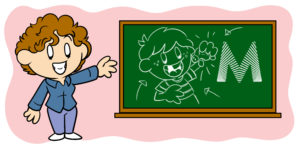Want to hook readers so they can’t walk away from your book? Want to catch an agent’s attention and stand out from the rest of the slush pile? Want to get that elusive word-of-mouth buzz about your book? Writing an amazing first chapter is one of the most powerful ways of achieving these goals. Easier said than done, though, right?
Below I’ve outlined some of the most essential elements to writing a strong story beginning. And as an example, I’ll show you the very short but powerful first chapter from Daniel Handler’s YA novel Why We Broke Up.
The hook
You’ve probably read all about the hook. But in case you haven’t, the hook is how you capture the reader’s full attention in your first line and first paragraph. Getting a compelling opening is SO important. It’s your first impression with a reader, your chance to convince them that your book is one they must keep reading.
So, what makes a good hook? There are many possibilities, but some tried-and-true approaches are:
- raise a question the reader must see answered,
- jump into the middle of the action,
- start at the moment of the protagonist’s predicament,
- make a statement of promise or great possibility.
However you go about it, the key is suspense: string your reader along so they MUST keep reading.
Here’s how Why We Broke Up starts.
Dear Ed,
In a sec you’ll hear a thunk. At your front door, the one nobody uses. It’ll rattle the hinges a bit when it lands, because it’s so weighty and important, a little jangle along with the thunk, and Joan will look up from whatever she’s cooking … she’ll go and see. You won’t, Ed. You wouldn’t … so it’s your sister, Joan, who will open the door even though the thunk’s for you. You won’t even know or hear what’s being dumped at your door. You won’t even know why it even happened.
You don’t know what this book is about yet—you can guess by the title and by the fact that the story starts as a letter—but does it matter? Did it grab you by the collar and make you have to know what’s waiting for Ed at his front door and why it’s there?
That’s the power of starting with a great hook.
The story question
What is the story question? It’s the problem or predicament at the heart of your plot or character arc. In short, it’s what your book is about. Giving readers a sense of the story question in your first chapter is key. Because it prolongs and builds on that suspense you created with the hook. It’s how you make them keep reading.
Okay, so we’re curious; we want to know who this Ed guy is and why he’s getting dumped and what the thunk is at his front door. We can infer that this book is about a breakup. But it’s more nuanced than that, right? Look at how Handler goes a step further using the story question right at the end of his first chapter to keep us locked in to this story.
I’m telling you why we broke up, Ed. I’m writing it in this letter, the whole truth of why it happened. And the truth is that I goddamn loved you so much.
So, this may be a bit too straightforward for some of us, but it works for this genre and this particular story concept. My point is, somewhere in your first chapter in some way (doesn’t have to be this direct), state the story problem for your readers. This will help them commit. They’ll go (subconsciously), “Oh, that’s what this story is about,” and they’re ready to go the distance with you, to take this journey with your characters.
The character introduction
Speaking of characters … your readers need to meet main characters in the first chapter. Unless delaying this introduction is a very strategic part of your story, the first chapter should be about your protagonist and their predicament. Who is your main character? What is his/her daily life like that’s about to be disrupted by the plot of this story? What do your characters care about and what are their goals? And most importantly, why should readers care about this protagonist? Show them and they’ll keep reading.
By the end of the first chapter of Why We Broke Up, you’ve met Ed, his sister Joan, and the (unnamed) protagonist, Min. They’re the three central characters of this story, and in one page you learn quite a lot about who they are, what they’re like, and what they care about. And by the end of this one page, you start to care too.
The tension
Once you create this delicious momentum in your first paragraph, you want to keep it going. Filling your opening scenes with (authentic) tension is a great technique for doing this. Tension comes in many shapes and sizes—action, loaded dialogue, heightened emotions, foreshadowing, etc. One way to figure out where the inherent tension is in your story is to look at your story question: what implications does it have for these characters we are starting to care about? Let readers feel that so strongly on every page that they have to keep reading. Watch how Handler does this with setting and mood.
It’s a beautiful day, sunny and whatnot. The sort of day when you think everything will be all right, etc. Not the right day for this, not for us, who went out when it rains, from October 5 until November 12. But it’s December now, and the sky is bright, and it’s clear to me. I’m telling you why we broke up, Ed.
The action
A big complaint about writing the first chapter is what to do with backstory. Here’s the scoop: Avoid it. Most of it, anyway. If you’ll start where the action is, just before your protagonist encounters his/her predicament, you can sprinkle in just enough backstory to ground your readers. The rest needs to come later as readers get to know your character along the way.
What kind of backstory do we get about Min and Ed? They were dating for a month and now they’re breaking up. Min is bringing Ed something that goes thunk at his front door and she was in love with him. It’s not much, is it? But do you need more right now? Having read it, I can tell you that the momentum in this story is about what you don’t know, what you have to find out as the story goes on.
What pieces of your story are absolutely essential for readers to know in your Chapter 1? Leave the rest for later and dole them out at just the right time. That’s how you write a stellar first chapter and keep readers hanging on.
The voice
One thing I consistently hear about agents slogging through their slush pile is that a unique voice stands out above the crowd. I’m NOT advocating that you go crazy and write in a way that’s not genuine to you just to get attention. I think the key is to immerse yourself as deeply and authentically as you can into the lives and personalities of your characters so that you start to take on their voices.
To me, that’s one of the strongest elements of Why We Broke Up. You learn about Min later that she’s a junior in high school, and she’s obsessive about old and obscure movies. Can’t you hear that in her voice? The sense of drama and flair? You really lose the sense of Daniel Handler the author and dive deeply into Min’s world, her concerns, her heartbreak. It’s in the drama and emotion, but it’s also in the kinds of metaphor and simile Handler uses—he writes the world of the story through Min’s eyes, from her mind. The narrative voice itself is shaped through her experience, not from outside it looking in.
It’s all these little things coming together to create a unique sense of voice, and it all starts with immersion into the character’s world and his or her most deeply held concerns, interests, and values. So, go and dive into your character, immerse yourself, then come back to that first chapter and see if you don’t have a refreshed, nuanced voice.
Writing Chapter 1 can sometimes feel like a gargantuan task. But don’t let yourself get overwhelmed. The elements of an amazing first chapter are no secret, and you can use them as tools to construct the right opening for your story. Take some time and review these, go read some other strong first chapters, saturate yourself in the world of your story and characters, then come back to your Chapter 1. You’ll see it in a new light, and you’ll be armed with new tools and fresh inspiration to get your story opening in great shape.
What elements do you rely on when writing your first chapter? What parts are hardest for you in getting your story opening off on the right foot?






6 thoughts on “What Everybody Ought To Know About Writing A First Chapter”
What if a writer has difficulty forming a voice because he or she is employing third-person narration despite the usage of dialogues between the protag and other characters as well as spare usage of the protag’s internal monologue?
Hi Chantale,
Finding your authentic narrator voice within a story can be a real challenge. Many writers find third-person narration especially challenging in the way it views the action, emotion, and feelings of the protagonist from a distance. Third-person narration still has many advantages, though.
If you’re committed to using third-person narration, one thing you might do is spend some time away from your story just trying to get more deeply entrenched in the world, emotions, background, and thoughts of your character (using techniques like interviewing your character, visualizing scenes through their eyes, imagining past scenes that aren’t included in the book, etc.). Then when you revisit your manuscript, you might find yourself writing with a fresh voice.
Here are several other related articles from our site that might be helpful to you in exploring this topic:
//www.standoutbooks.com/3-questions-need-answer-can-write-strong-distinctive-voice/
//www.standoutbooks.com/can-include-accent-dialect-dialogue/
//www.standoutbooks.com/third-person-point-view/
Best of luck with your book!
Wow! Paige, thank you for your solid suggestions, expertise and guidance with regard to third-person narration. I will stick with that POV for my novella-in-progress. I had toyed with the idea of changing to first-person POV to make the unreliable narration stronger, but — as I’ve learned from reading articles here on STANDOUTBOOKS — the advantages of TPN are too attractive to resist for the purpose of my story’s plot progression.
Without realizing it, I was on a decent path earlier this year, during winter, having traveled to the location where the book takes place. (Relatives didn’t understand that, occasionally, writers can’t help writing when they say, “I’m traveling on vacation. Writers can’t separate writing from their identity, and we can be creating a piece despite stepping away from a novel or short story or screenplay or poem.)
I smiled reading the portion of your reply involving fresh insight on a character. During the aforementioned vacation, I purposely got lost in my vacation destination and disciplined myself to walk in my main character’s shoes (or snowboots, as it were). If there was an incident or scene or natural phenomenon that would not have fazed me, I imagined how it would faze my protagonist — and the result was invigorating, even in subzero temps!
Following your recommendation, I’m setting the book (novella) aside for a bit. I love the idea of giving my creative mind a break in terms of that project, and I trust (myself) that my devotion to the protagonist — troubled woman that she is — and my compassion for the dear victim, er, fellow that she might encounter will make me embrace the novella’s development like a baby. And like a baby, in due time.
I relish the plan of returning to that city for fresh insights into her motivations and actions, as well as those of several other characters, taking a few notes and not just relying on reference shots with my camera. There are more than a few twisty, medieval streets that I’d like to wander. However, when I return home, I’ll do as you suggest and set aside my manuscript again and for a while, perhaps for several weeks.
I realize that I was frustrating myself further by not letting go of the ending. Hopefully I’ll convince the stubborn writer in me to stop trying to make the story fit the ending. But, alas, it might have been such an awesome ending for the readers as well as for me.
Lastly, thank you so much for providing links. This morning I’ll be reading all info contained therein, coffee mug in hand and caffeine in my bloodstream. Paige, merci beaucoup pour tout.
Chantale,
It sounds like you know exactly what you need to do to delve deeper into your character. Traveling on location whenever possible; immersing yourself in your characters’ shoes; imagining their thoughts, actions, and feelings; setting your manuscript aside to get helpful distance–these are all such great ways of getting renewed perspective and developing your narrator voice. Judging from your note, I’d guess you have very strong intuitions as a writer about what your characters and your story need; trust them, they’ll serve you well.
Best wishes!
Excellent tips as always! One thing I was surprised wasn’t covered in this post is pacing: The first chapter (or few chapters) sets the pacing for the rest of the story. If the beginning is slow, the readers will expect the broad average of the pacing to be slow-ish; if the beginning is fast, vice versa.
I rewrote my first chapter (well, first few chapters, same idea) at least three times, trying to find a good setup. In the end, I accidentally implemented a lot of the advice in this post: posing the question of the story, introducing characters, creating tension with foreshadowing, leaving out backstory.
One question for you though, if you have the time. I wonder about the actual criticality of the “first sentence” or “first paragraph”, especially in a slow-paced fantasy/adventure story of 120,000 words or so. The first chapter of my book is a good setting for the story – it opens on a tense conversation between friends, foreshadowing the plot and the questions that will be posed and answered, etc – but the first sentence is merely “Hey Chris.”, and the first paragraph isn’t that much more descriptive.
I’ve read books that don’t have memorable opening sentences/paragraphs and were nonetheless excellent, but I would like a second opinion. Is there something inherently better about an instantaneous, highly-gripping hook?
Hi Jenya,
Thanks for commenting, and for the great point about setting pace.
As for the first line, this is something we went on to address in Does Your First Line Really Matter? (Spoilers: we came to pretty much the same conclusion you did.)
Best,
Rob